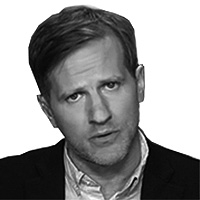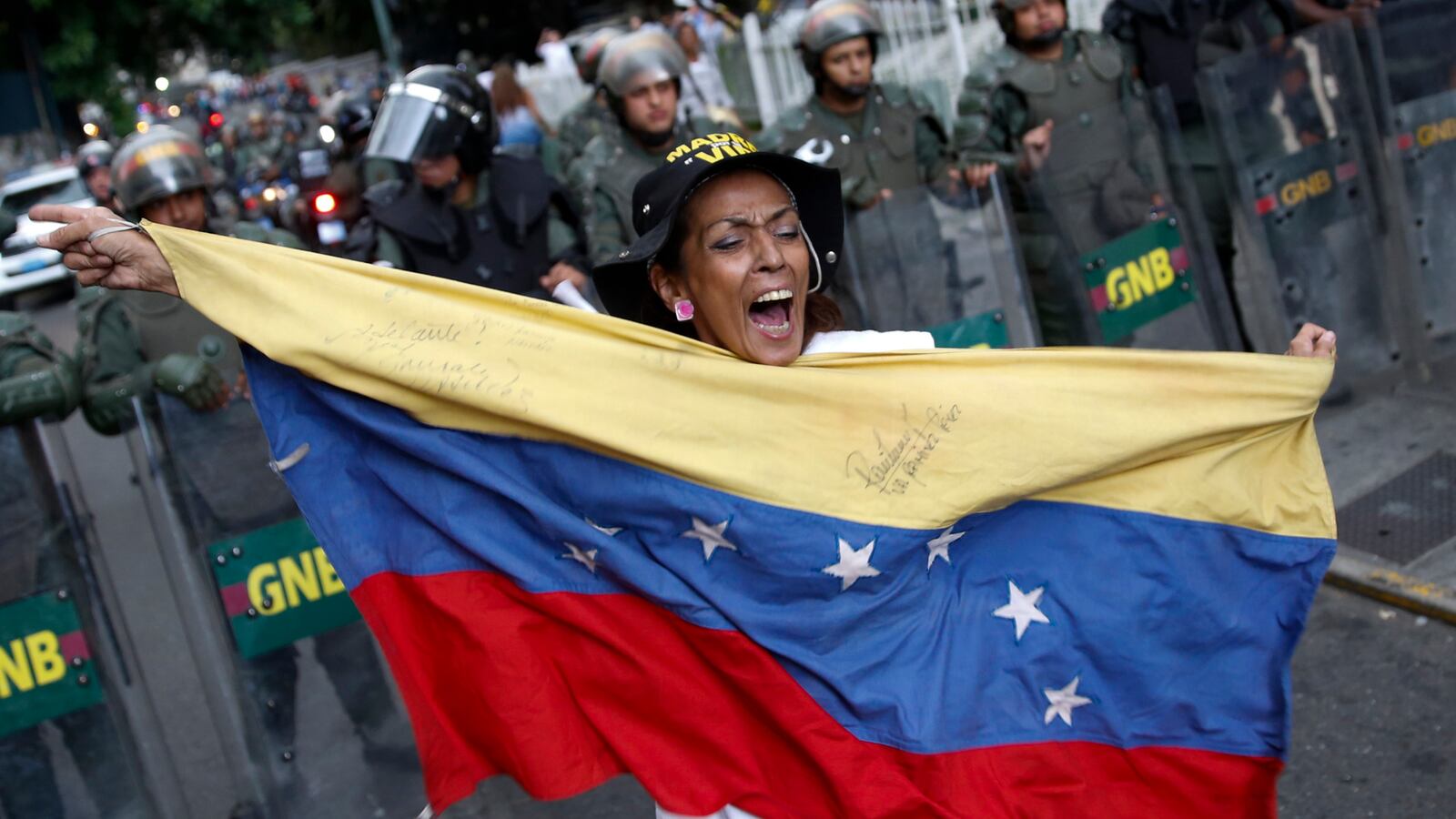At the southernmost point of Central Park, on a small strip of sidewalk abutting 59th Street, hundreds of Venezuelans swarmed a statue of Simon Bolivar, the Caracas-born liberator of South America and a figure now most commonly associated with the bolivarian revolution of Hugo Chavez and his rechristened Bolivarian Republic of Venezuela. But it’s an association that when mentioned in this crowd produces furrowed brows and narrowed eyes, quickly followed by a rapid-fire recapitulation of Chavez’s many crimes.

The necessary symbolism of the meeting point trumped practicality: the crowd quickly swelled, spreading like an inkblot from the small patch surrounding Bolivar into a lane of midtown Manhattan traffic. They banged pots. They shouted slogans about the Cubanization of their patria, from which many are exiled. They carried signs detailing spiraling crime rates (23,000 murders last year), many plastered with grim photos of those abused and murdered, and others with mordant slogans (“In Venezuela everything is scarce, except bullets”).
We are far from the bloody streets of Caracas; these protesters are ringed not by heavily armed and body-armoured National Guardsman, but are politely attended to by a handful of paunchy and bored New York City cops. There was no threat of violence here--with the single exception of a slobbering, toothless, and possibly blotto Spanish speaker who, while ambling past the crowd, shouted something that drew the ire--and very nearly the flying fists--of a man with a large Venezuelan flag tied around his neck--the anti-Chavez superhero.
It was unclear what the slurring Chavista provocateur said, but surely, I told a woman next to me, it was a case of commitment to alcohol consumption and not commitment to revolution. But one had to admit, I continued, that many outside of Venezuela, including a small segment of the media, have fallen for the crude propaganda oozing out of Miraflores Palace. All over the internet, one finds a seemingly inexhaustible supply of useful idiots and Sandinista nostalgists willing to contextualize the disastrous Bolivarian Revolution.
One would think such fellow travelling had died with Chavez. Another failed evolution failed, another utopia unarmed. But one would be astoundingly wrong. I haven’t the time or the stomach to offer a full accounting of Western apologists for Chavez’s successor Nicolas Maduro, but a few recent examples should give a sense of the rot. A writer at Al Jazeera, Belen Fernandez, denounced the recent appearance of the “elite right-wing Caracas blogger Emiliana Duarte” on the Qatari network, blasting her for “launch[ing] into a sob story about having to visit 10 different supermarkets the previous year during a quest to bake a cake.” Duarte was merely cataloging the massive shortages of basic goods (rice, milk, toilet paper) that have crippled Venezuela in recent years, not engaging in a bourgeois, fascist bakeoff.
The benignly named Washington think tank Council on Hemispheric Affairs, whose “experts” are frequently quoted in the mainstream media, blared on its homepage “Venezuelan Government Shows Restraint and Resolve in the Face of Anti-Chavista Mayhem.” Over at the Huffington Post, a self-identified “human rights lawyer” lamented that “without irony, the media fulminates about Venezuela's alleged lack of democracy...to justify its open support of Venezuela's elite opposition.” He then credulously quoties a Chavez loyalist’s assessment that the “Venezuelan economy is doing very well,” despite the empty shelves, capital flight, and runaway inflation.
A pro-Chavez academic writing in The Nation argued that the massive street demonstrations across the country “have far more to do with returning economic and political elites to power than with their downfall.” The Guardian headlined a news story: “Venezuela's hardliner reappears as Nicolas Maduro expels US officials.” That hardliner wasn’t Maduro, whose government is arresting regime opponents and strangling the free press, but Leopoldo Lopez, the opposition leader currently languishing in jail. Flip over to the Guardian’s editorial for the bizarre excoriation of President Obama for his supposed “support for regime change in Venezuela.”
It’s a thought experiment I often present to the Western Chavista, one that usually ends up demonstrating that sympathizers of the regime, both in this country and in Europe, have something of a colonialist attitude towards Venezuela. Because one wonders the reaction of these faux progressives if Prime Minister David Cameron, President Barack Obama, Chancellor Angela Merkel--pick your the imperialist lackey!--arrested an opposition leader who had organized peaceful street protests? Or if the CIA shut off the internet in politically restive cities like Berkeley and Brooklyn; blocked Twitter traffic it found politically suspect; and took over PBS, forcing it to broadcast only pro-administration agitprop, never allowing the opposition party to traduce the government across public airwaves? Or if the president forced the removal of BBC America from all cable providers for being too anti-American?
Perhaps reactions would be muted if motorcycle gangs loyal to President George W. Bush circled anti-Iraq War protests physically attacking--and occasionally murdering--demonstrators. How about if a judge ruled against President Obama’s domestic spying apparatus and, in return, the White House ordered that judge thrown in prison? How long would an American president be allowed to run up massive inflation, despite massive oil revenues coming into government coffers? How long would it be considered reasonable--and not the president’s responsibility--to preside over 23,000 murders in a country of just under 30 million people, a rate that would horrify the average resident of Baghdad? How long could supermarket shelves remain bare of basic staples like bread and milk before The Nation or The Guardian would gleefully decide that America was a failed, kleptocratic state? Or if Bush or Obama’s economic policies meant that toilet paper could no longer be found on the open market?
So I ask a rather straight-forward question to those who pretend to care about the Venezuelan people (much like those who miraculously lost interest in the Vietnamese people after 1975 or the Nicaraguan people after 1990), those who care so deeply for the poor and destitute in Latin America: Why the double standard?






